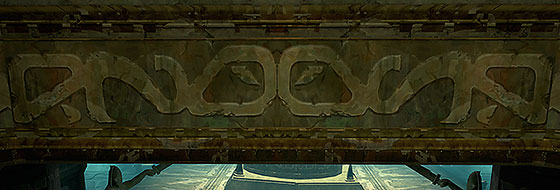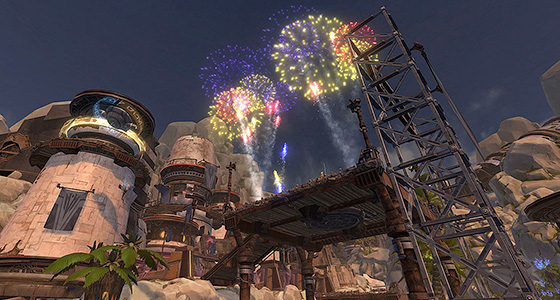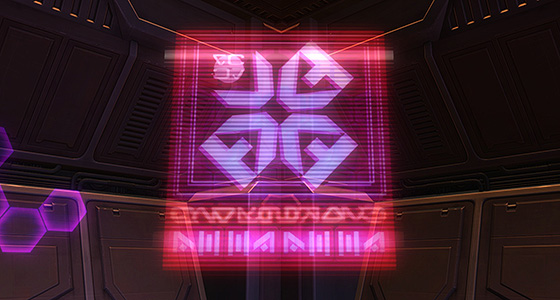I thought this one would be easy. I really did. I had planned to post this recreation during the Nar Shaddaa Nightlife event since this neon sign can be seen around the moon’s Promenade and casinos. Clearly, I’m late to the party.
The challenge of this recreation was not in the translation. Like many similar signs, it seems to be a collection of random letters in which I’ve long since given up attempting to find meaning.
At first glance, one might think this sign is written in Aurebesh. Technically, however, it uses Galactic Basic, a font that, like Aurebesh, was inspired by the script used on monitors in Return of the Jedi. Galactic Basic is actually more accurate to what can be seen in the movie, but Aurebesh was codified in official sources first and has since become the official version of the language.
The center logo, the inset letters on the upper left and the two repeating glyphs on the bottom are all written using Galactic Basic. The orange tinted letters in the next-to-bottom row are rendered in the Atrsian font. Like Aurebesh, this font has a tangled history. It also can be glimpsed in Return of the Jedi, and was featured in several early Lucasarts games.
My guess is that all these fake space letters were meant to be parts of the same “language” but because they were fleshed out separately, they all became individual fonts and scripts. I’m certain that had high definition screen captures and copious reference materials been around three decades ago, the current landscape of Star Wars’ written word would be very different!

The use of Atrisian is not an usual sight in SWTOR. This script can be seen not only in signs on Nar Shaddaa, but also carved in the ancient ruins of the Rakata on Belsavis. It’s amusing to think the same glyphs that adorned the great works of a long lost civilization are still emblazoned in neon around the galactic underworld.
The large logo in the center is what caused me the most trouble. The repeated letter rotating around the center translates to J, but I’d wager it was not selected because of any particular meaning but because of how the alien glyph maintains its symmetry in the arrangement. The English J, however, is not quite so accommodating and I tried many variations, fonts and even custom letters attempting to replicate the original layout. In the end I realized I was overthinking the problem, and took inspiration from the actual design. Reshaping the glyph to resemble a J more or less did the trick. I don’t think my recreation is as stylish as the original, but it’s close enough that I hope it gets the idea across.
Living Large on the PTS

Despite having played since launch, last week was my very first visit to SWTOR’s test server. I cannot deny it was fun to get an early peek at the Rishi stronghold and queue up for Saturday’s PVP test.
My first impression of the Rishi stronghold is quite good. I think they are aiming to address the major complaints regarding the previous strongholds on Umbara and Manaan. Unlike Umbara’s train, Rishi has a large variety of environments to explore and decorate, from the massive pirate airship to the beach and the cove. It also looks like they are paying more attention to how decorating hooks are being used. As much as I love Manaan, the widely spread out hooks and limited choices of what hooks are even available has been a source of frustration. Rishi seems to have a larger variety of hooks, placed closer together so that decorators will be able to create areas with more cohesion.
The PVP areas are a gimmick to be sure. But it’s a cool gimmick. And even if I’m just using it every once in a while, I’m fine with that. As with the addition of target dummies, having more stuff to do in our strongholds is something I’m glad to see. I hope they continue to explore more ideas in the future. Maybe there could be a special boss on the pirate ship that can only be summoned during the Bounty Broker event, or a stronghold zombie survival mode in which the beach is swarmed during the Rakghoul Resurgence. Armchair developing is easy! But, hey, I can dream, can’t I?
I also participated in Saturday’s PVP testing during the morning and evening sessions. I don’t PVP a whole lot so take these comments with a grain of salt.
For the most part it seemed like the matchmaking worked. There were a ton of healers in the morning queue, but the teams had even numbers. The matches with three healers per side tended to stalemate; I imagine with a larger pool of dps that wouldn’t happen as much. I did notice that backfilling in arenas would not always keep the tank/healer balance, but I guess filling empty spots quickly might be more important.
I thought the Mandalorian arena was pretty cool. All my matches there were fought on the top level, so I don’t know if the lower ring or tunnel will see much action.
I ran four Voidstars during the day, and aside from the one with six healers, they definitely went faster. Once the first door opens, the other matches became a race to the finish, which I consider an improvement.
Overall, I went 7 and 6, which I rate a smashing success and had a really good time. It seems like most folks were there to poke around and have some low stakes fun. It was neat to cross paths with some SWTOR celebrities, and I like to think my healer saved a dev or two from certain death once or twice during the day.
I’m definitely in the camp that is happy to see the return of open PTS testing. That the good folks at Bioware have been quick to implement changes that have come from feedback has been great to see. I hope to visit the test server more in the future.

